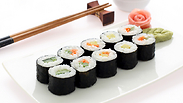
Except for the shouting out of cooking instructions, only the sizzle of the skillet was heard on the patio surrounding the kitchen where Boaz Tsairi and Atsuko Ikeda chopped, toasted, crushed and mixed sesame, tofu and a variety of vegetables.
The only sounds heard from the large crowd surrounding them were those of people struggling to find a place to sit or stand, and the occasional complaint when someone with a camera blocked the view.
"Our goal is to introduce people to Japan," said Eyal Lavit, joint-CEO of The Edge, a company specializing in cultural events, and the producer of Israel's Japan Culture Week. "We want to be able to show even just a glimpse of this rich and beautiful culture."
The chefs' participation in the affair was a cooking demonstration where those present learned what ingredients were available locally in order to make traditional Japanese meals. Tsairi, a native Israeli who has been working in the Japanese food industry for over 30 years, became acquainted with Japan's cuisine while living in Canada.
"My first introduction to Japanese food was in British Columbia, at an exhibit where I was helping to bring ingredients for a dinner that night," Tsairi told The Media Line. "But it wasn't the typical Japanese food, it was the high-class, elite food, and I thought, 'I have to study this.' "
True to his word, he spent the next few years working in Tokyo kitchens, where he learned the art of traditional Japanese cooking from several different chefs in the city, and from his wife's family members, several of whom work in the food industry.
Upon his return home in 1993, Tsairi opened Sakura, the first Japanese restaurant in Jerusalem, at the time bringing the grand total of Japanese restaurants in Israel to three.
"There wasn't an industry before then! I've been working in (the Japanese food industry) for the past 25 years, and it's finally gotten good," Tsairi said.
In order to create that industry, Tsairi had to grow most of the vegetables and manufacture other ingredients himself. Additionally, he had to convince the tofu factories to make Japanese tofu and pastas, and to make them using the traditional Japanese ingredients so they would get the taste right.
The demand for Japanese food products in the Israeli market had been on the rise since the late 1990s, when sushi bars became a trend in the country. Since then, demand for Japanese food products has increased, along with the availability of products imported from Japan.
"The interest by the Japanese business sector in Israel is increasing, and tourism to Israel has increased as well," said Kei Takagi, manager at Japan External Trade Organization (JETRO). "The Israeli market is very small, but the (gross domestic product) per capita is very high, and people here buy a lot. It's an interesting market with lots of potential," he told The Media Line.
Currently, most popular Japanese imports are sauces, such as soy sauce, mirin and miso, as well as sake. Japan currently has 90 percent of the market share for soy-sauce, 85 percent of the market share for mirin, 85 percent of the Miso share, and 95 percent of the sake market shares. These are the best-selling products in Israel because they've been found to mix well with local food and ingredients.
"Miso, bean products and sauces became a little more popular in home cuisines, not just restaurants," said Mika Sharon, a renowned Israeli chef with experience in global Japanese cuisine. "They're part of the local flavors now. Even if it's not authentic Japanese, the whole style of eating is part of the lifestyle now."
While the industry grew, many of the restaurants didn't keep an authentic Japanese kitchen, especially sushi bars that adapted to kosher food regulations.
In Japan, kosher food wasn't common until recently, and getting a kosher certification for the food products they import into Israel is costly. But more Japanese manufacturers are getting their food certified as kosher now, since it opens not only the Israeli market, but also to markets in the US and other communities with similar dietary restrictions.
Additionally, Takagi told The Media Line that having a kosher certification also puts out an image of healthier food, a misconception that food manufacturers readily welcome.
Healthier food has been a recent trend in Israel, and a contributing factor in increasing the popularity of Japanese food. An increase in the demand for miso and tofu has worked to bring more Japanese products into Israeli markets.
Tsairi also attributed the higher demand for Japanese products to a rise in vegetarianism and veganism. The tofu sales doubled in the last two years, and the importation of seaweed sheets went from 19,000 in 1993 to 26 million last year.
Things have changed since Tsairi opened his restaurant: there are now 500 Japanese eateries in the Jewish state.
Right now, any talk about Japanese food in Israel is usually focused on sushi, which somewhat limits the market. But as the interest in Japanese food rises, so does the potential to introduce even more products into the market, something JETRO is currently interested in pursuing, since many importers are looking for products with the "Made in Japan" seal, which brands the products as safe and of good quality.
Whereas Japanese restaurants and sushi bars used to be a staple in cities and urban centers, the trend has since spread to other areas and become a staple of most communities, successfully ingraining itself into suburbs and cities, and becoming a part of the local culture.
"There's a lot of inspiration taken from the Japanese cuisine on other local cuisines," Sharon told The Media Line. "There are sushi bars in Eilat, in Beersheba, places where the population isn't urban, but everyone is eating it now."
Article written by Samantha Badger.
Reprinted with permission from The Media Line .















